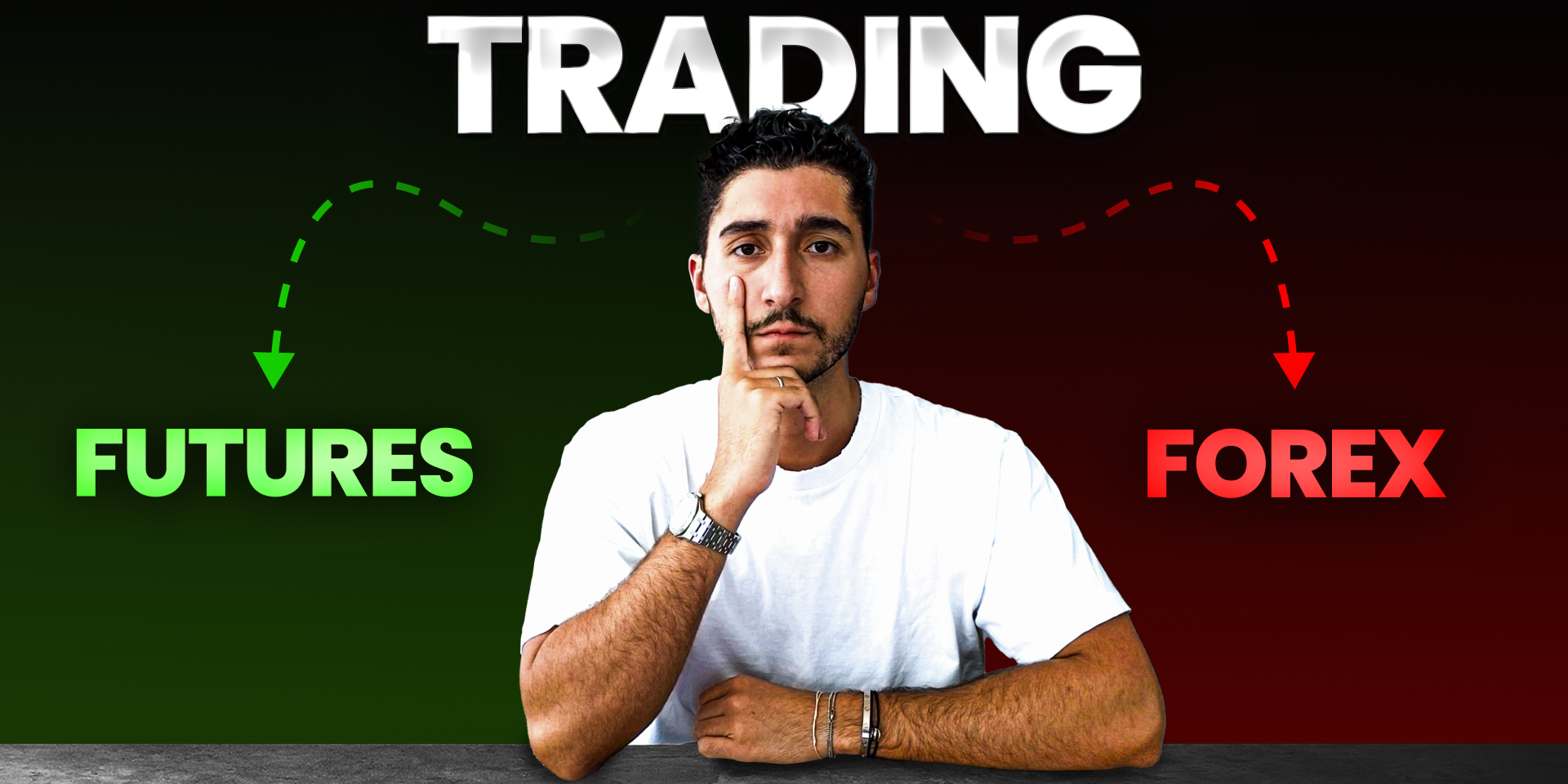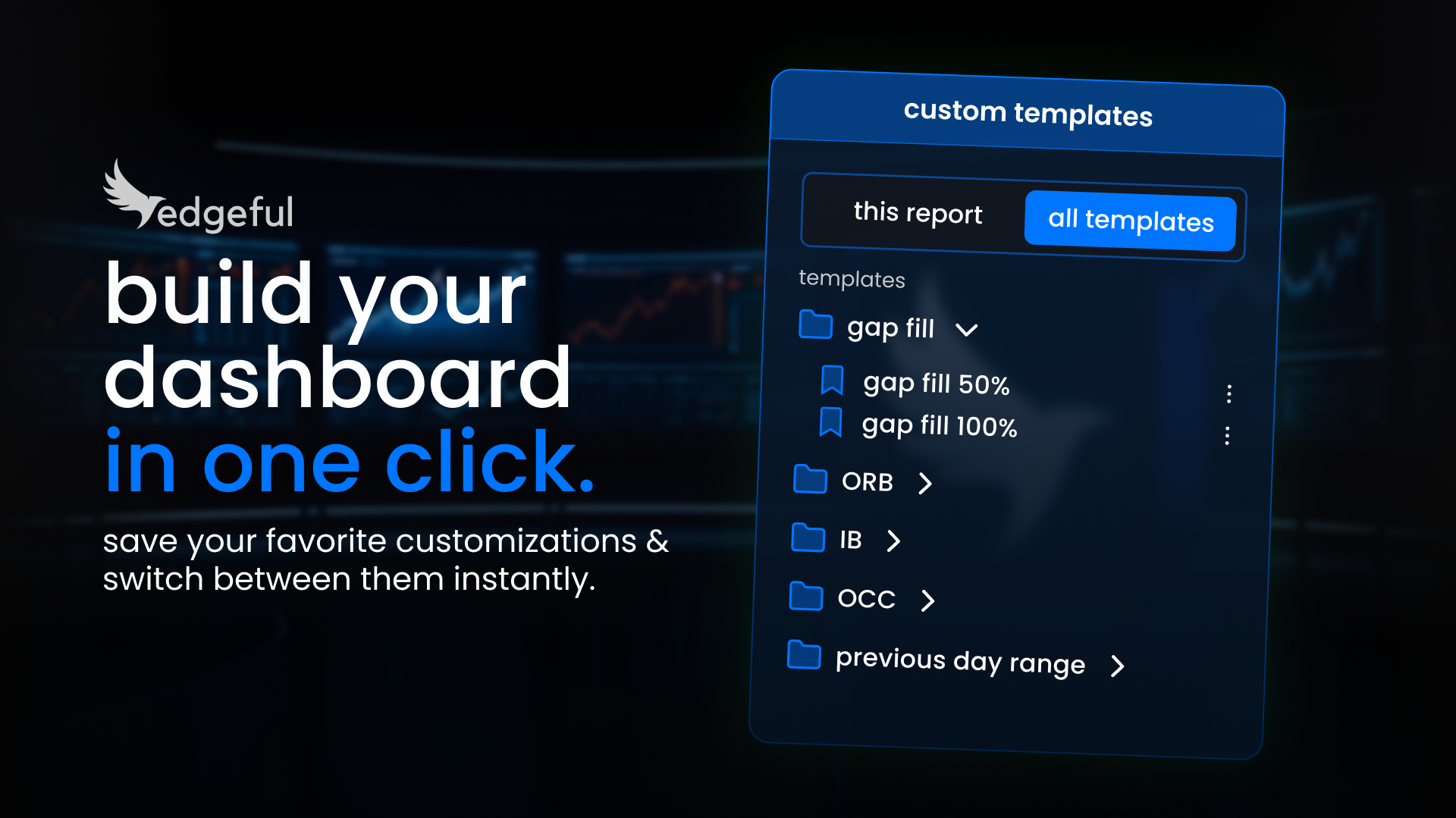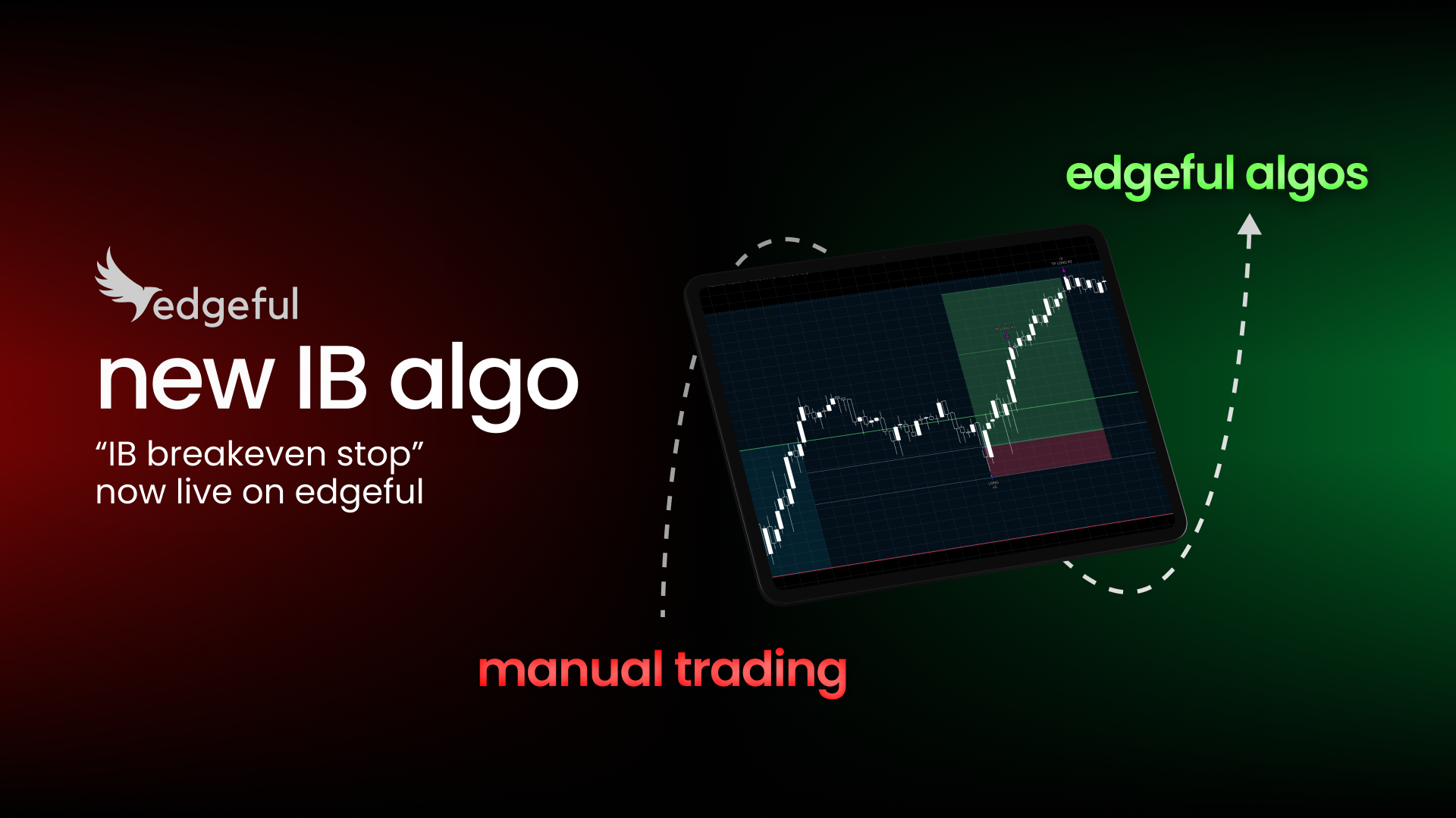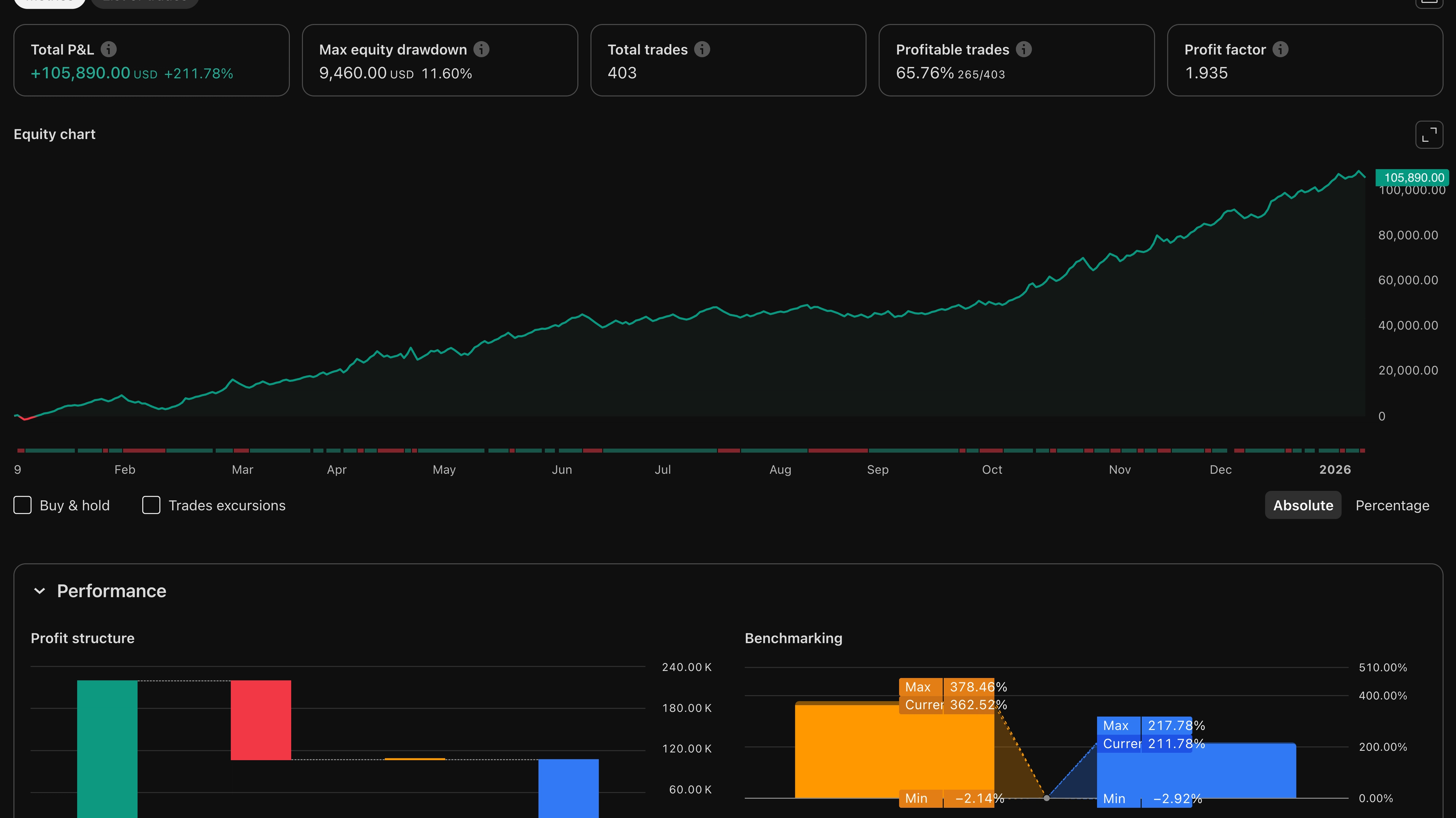futures vs forex: which one should you trade? (2025 guide)

after working with thousands of traders, I keep getting the same question: "should I trade futures or forex?"
and by the end of this blog, you’ll have all the data you need to make the best decision based on your goals as a trader.
in this breakdown, I'm going to show you the real differences between futures vs forex trading, backed by actual data and real examples from my years of trading.
table of contents
- why this comparison matters for new traders
- the regulation problem with forex (and why it's huge)
- leverage and capital requirements: the real numbers
- liquidity differences that actually matter
- prop firm opportunities in both markets
- tax advantages you need to know about
- when forex might make sense
- edgeful data on both markets
- frequently asked questions
- key takeaways for beginners
why this comparison matters for new traders
let's get into why this decision is so critical...
I've talked to thousands of traders over the years, and here's what I see happening: beginners choose their market based on whoever has the flashiest ads or promises the biggest returns. that's never how it should be.
the reality is that your choice between futures vs forex trading will impact everything — your capital requirements, your tax situation, your broker reliability, and ultimately your chances of success.
most forex marketing targets new traders with promises of "trade with $50" or "1000:1 leverage!" sounds exciting, right? but here's what they don't tell you: that same leverage that looks attractive is often what destroys new accounts within weeks.
meanwhile, futures trading gets less attention because it doesn't sound as sexy. no one's promising you'll turn $100 into $10,000 overnight. but that's actually a good thing — it forces you to approach trading like a business instead of a lottery ticket.
the data backs this up. in our edgeful reports, we track success rates across different markets, and what we find is that traders who start with futures tend to develop better risk management habits from day one. why? because the market structure forces them to.
but before you make any decisions, you need to understand the fundamental differences between these markets. and the biggest one isn't what you think...
the regulation problem with forex (and why it's huge)
here's something that'll probably surprise you: forex doesn't have a central exchange.
when you trade EUR/USD on Oanda, you're getting a different price than someone trading the same pair on Forex.com. they're literally different markets with different prices. that's because forex is "over-the-counter" (OTC) — meaning each broker creates their own market.
now compare that to futures trading...
when you buy one ES contract (S&P 500 futures), you're buying it on the Chicago Mercantile Exchange (CME). everyone gets the same price. there's one central order book, regulated by the US government, with transparent pricing for everyone.
that's not just a technical detail — it affects everything about your trading:
broker trust issues in forex:
- your broker is your counterparty (they take the other side of your trade)
- if you make money, they lose money (conflict of interest)
- offshore regulation or no regulation in many cases
- withdrawal problems are common with smaller brokers
futures exchange protection:
- your broker is just the middleman to the exchange
- regulated by the CFTC in the US
- segregated accounts (your money is protected even if broker fails)
- transparent pricing with no manipulation
I'm not saying all forex brokers are scams — there are legitimate ones. but as a beginner, why take that risk when you can trade on regulated exchanges instead?
and here's another thing most people don't realize: those "tight spreads" forex brokers advertise? they can widen them whenever they want. during high volatility (when you most need tight spreads), they often expand dramatically.
with futures, the spread is determined by the market, not your broker. what you see is what you get.
but let's talk about something that might matter more to you as a beginner: how much money you actually need to start...
leverage and capital requirements: the real numbers
this is where things get interesting, because the marketing doesn't match reality...
forex leverage claims vs reality: forex brokers love to advertise 500:1 or even 1000:1 leverage. but here's what they don't mention — most regulated brokers (the ones you should actually use) are limited to 50:1 leverage in the US, and 30:1 in Europe.
even if you could get 1000:1 leverage, you shouldn't want it. that means a 0.1% move against you wipes out your account. it's not a feature, it's a bug.
futures leverage that actually makes sense: with futures, you can start trading with legitimate leverage using much less capital than most people think.
let me break down the real numbers:
- ES minis (ES): controls $50 per point of the S&P 500
- NQ minis (NQ): controls $30 per point of the NASDAQ
- day trading margin for minis: $500-$1,000 per contract at most brokers
- overnight margin for minis: $11,000-$15,000 (varies by broker and market conditions)
- micro ES (MES): controls $5 per point of the S&P 500
- micro NQ (MNQ): controls $2 per point of the NASDAQ
- day trading margin for micros: around $100-$200 per micro contract
- overnight margin for micros: $1,000+ per contract higher (which discourages overleveraging)
so with $1,000, you can comfortably day trade a handful micro contracts. if the S&P moves from 5,000 to 5,010, you make $50 ($5 per point, x 10 points) per MES contract. that's meaningful movement without crazy risk.
here's the best part about futures margin structure: it naturally teaches good risk management. because overnight margins are so much higher, you're incentivized to close positions before market close. this keeps you from making the classic beginner mistake of holding losing positions "hoping they'll come back."
compare that to forex, where there's no difference between day and overnight margins. new traders often hold losing positions for days or weeks, watching their accounts slowly bleed out.
capital efficiency comparison:
- forex: need significant capital for meaningful position sizes with safe leverage
- futures: can trade meaningful size with $1,000-$5,000 accounts using micro contracts
and if you're worried about making enough money with smaller position sizes, remember: it's better to make consistent small profits than to blow up trying for big ones.
liquidity differences that actually matter
when people talk about liquidity, they usually focus on the wrong things...
forex liquidity myths: yes, forex is the "most liquid market in the world" - but most of that liquidity is institutional. banks trading billions with other banks. as a retail trader with a $10,000 account, you're not accessing that liquidity.
you're accessing whatever your broker decides to give you. and during high-volatility events (like economic announcements), many forex brokers either widen spreads dramatically or stop taking orders entirely.
futures liquidity reality: the major futures contracts (ES, NQ, YM, RTY) have incredible liquidity during market hours. we're talking millions of contracts traded daily, with tight spreads and instant fills.
but here's what really matters for day traders: you can always get out of your position. always.
I can tell you from experience — when things go wrong in futures, you can hit the "emergency exit" and get filled immediately at the market price. with forex, especially during volatile periods, you might see "requotes" or "connection issues" right when you need to exit most.
the other advantage of futures liquidity is predictability. you know that ES will have tight spreads from 9:30 AM to 4:00 PM ET. with forex, liquidity varies dramatically based on which session is active, and it's not always clear when you'll get the best execution.
prop firm opportunities in both markets
both markets offer prop firm opportunities, but they work differently...
futures prop firms:
- well-established industry with clear track records
- evaluation process focuses on consistency over pure profit
- typical funding ranges from $25,000 to $300,000+
- keep 80-90% of profits after reaching profit targets
- examples: TopStepTrader, Earn2Trade, The Trading Pit
forex prop firms:
- newer industry with more variability in terms
- some focus on high-leverage scalping strategies
- funding ranges similar to futures
- profit splits vary widely
- more difficult to verify legitimacy of newer firms
the key difference? futures prop firms have been around longer and have more established relationships with clearinghouses and exchanges. the business model is proven.
with forex prop firms, you're often trading on the same retail platforms you'd use with a personal account, just with more buying power. there's nothing wrong with this, but it's a different model than the institutional-grade platforms most futures prop firms provide.
if your goal is to eventually manage significant capital, the futures prop firm path has more established career progression opportunities.
tax advantages you need to know about
this one's huge, and most traders don't even know about it...
futures tax treatment (US traders): futures get what's called "60/40 treatment" - meaning 60% of your gains are taxed at the long-term capital gains rate (much lower), and only 40% at your ordinary income rate.
this applies regardless of how long you held the position. you could buy and sell a futures contract in 5 seconds, and you still get this favorable treatment.
forex tax treatment: forex trades are typically treated as ordinary income, taxed at your marginal tax rate. for active traders, this can mean paying 30-40% in taxes vs 15-25% with futures.
important disclaimer: I'm not a tax professional, and tax situations vary. always consult with a qualified accountant about your specific situation.
but for many active day traders, the tax advantages of futures can save thousands of dollars per year. that's money that stays in your trading account instead of going to the IRS.
when forex might make sense
look, I'm not completely anti-forex. there are situations where it might make sense...
- 24-hour trading needs: if you live in a timezone where US market hours don't work for you, forex provides true 24-hour liquidity sunday through friday.
- currency-specific strategies: some traders specialize in currency relationships and economic events that specifically impact forex pairs. if you're deeply knowledgeable about currency markets, forex might fit your expertise.
- portfolio diversification: if you're already trading futures or stocks, adding some forex exposure can provide diversification benefits.
but here's the key point: these are advanced considerations. if you're a beginner asking "futures vs forex," you probably don't fall into these categories.
for most new traders, the regulation, tax treatment, and capital efficiency advantages of futures outweigh any potential benefits of forex trading.
edgeful data on both markets
at edgeful, we provide data-driven insights for both futures and forex markets...
our platform gives you probabilities and historical data for trading strategies across all markets. whether you choose futures or forex, you'll have access to:
- 100+ reports showing how strategies have performed historically
- real-time "what's in play" alerts for high-probability setups
- determine bias & sentiment instantly with our what's in play screener
- customizable subreports that match your trading style
- 5 years of historical data to validate your strategies
- 4 fully automated trading strategies to choose from
but here's what we've found in our data: strategies tend to be more consistent and reliable in futures markets. the regulated environment and centralized pricing creates more predictable patterns.
that doesn't mean forex strategies can't work — just that they require more careful broker selection and strategy refinement.
the bottom line? regardless of which market you choose, make sure your decisions are based on data, not emotions or marketing hype.
frequently asked questions
which is easier to learn, futures or forex?
neither market is "easy," but futures trading often has a clearer learning path. the centralized exchange structure means you're learning one set of rules that apply everywhere. with forex, broker-specific differences can create confusion for new traders.
which requires less capital to start?
both can be started with similar amounts ($1,000-$5,000), but futures micro contracts provide more meaningful position sizes with better capital efficiency. the key isn't the minimum to start, but having enough capital to manage risk properly.
can I trade both futures and forex?
absolutely. many professional traders use both markets for different strategies or portfolio diversification. but I recommend mastering one market first before adding complexity.
what about crypto futures vs forex?
crypto futures (like bitcoin futures on CME) combine the regulatory benefits of futures with crypto exposure. if you want crypto exposure, crypto futures often provide better regulation and tax treatment than spot crypto or crypto CFDs offered by forex brokers.
which market has better prop firm opportunities?
futures prop firms have longer track records and more established business models. forex prop firms are newer and more variable in quality. for serious traders looking to manage institutional capital, futures prop firms provide clearer career paths.
key takeaways for beginners
let me break this down into actionable points...
choose futures if:
- you want regulated exchange trading
- tax efficiency matters to you
- you're focused on US market hours
- you want access to established prop firms
- you prefer transparent, centralized pricing
consider forex if:
- you need true 24-hour trading
- you have specific currency market expertise
- you're in a timezone where US market hours don't work
- you want to diversify beyond equity-based instruments
regardless of your choice:
- start with paper trading first
- focus on risk management over profit potential
- base your strategies on historical data, not hunches
- never risk more than you can afford to lose
- educate yourself continuously
the most important thing isn't which market you choose - it's that you approach trading with the right mindset and proper education.
ready to start trading with data instead of emotions?
join thousands of traders who get our stay sharp newsletter every week. we break down market patterns, share real trading examples, and provide the data-driven insights that give you an edge.
no hype, no get-rich-quick schemes — just practical education from someone who's been trading for nearly a decade.
join the stay sharp newsletter →


